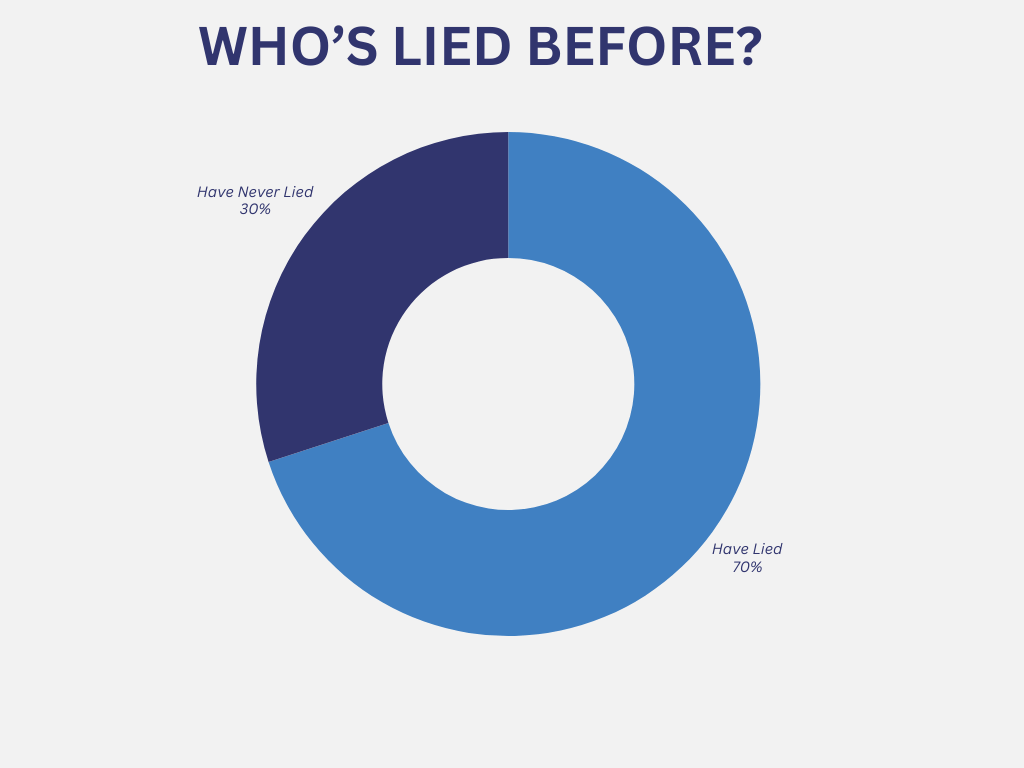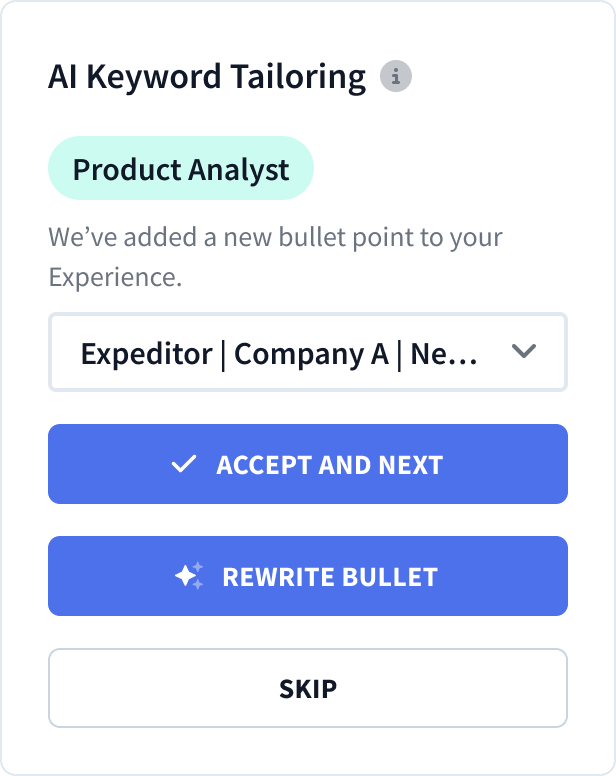Lying on a Resume: What Recruiters Really Think
Let's talk about something that makes both job seekers and recruiters squirm: lying
You've probably seen those viral social media posts about "hacking" your way past ATS systems or "optimizing" your resume to land more interviews. Maybe you've even wondered if everyone else is doing it, so why shouldn't you?
Here's the thing: your resume is a marketing document, but that doesn't mean anything goes.
I've spent years as a recruiter, and I'll tell you something most career influencers won't: there's a massive difference between optimization and resume fraud.
The line might seem blurry, but it's actually pretty clear once you know what to look for.
Key Takeaways:
- Lying on a resume can result in immediate termination
- 85% of employers catch resume lies during background checks
- Resume optimization ≠ resume fabrication
- Professional consequences can follow you for years
Lying on a Resume: Quick Facts
Lying on a resume means:
- Fabricating employment history
- Inflating job titles
- Claiming false achievements
- Exaggerating dates of employment
While not always illegal, consequences include:
- Immediate termination
- Damaged professional reputation
- Potential legal issues
- Failed background checks

Understanding Resume "Lies" vs. Optimizations
To some, this is considered lying on a resume.
But consider this: if I tell my kids we're having pasta for dinner and serve them spaghetti, did I lie? Of course not. It's just a more specific version of the same thing.
The same principle applies to your resume. Using industry-standard terminology isn't lying – it's speaking the language of your potential employer.
But here's where things get real: claiming you worked at Google when you didn't? That's not optimization – that's a straight-up lie. Saying you managed a team of 50 when it was actually 5? That's not "strategic presentation" – that's deception.
Let's break down what actually counts as acceptable optimization:
Using keywords from the job description that match your actual experience? Go for it.
Adjusting your job title to match industry standards (like saying "Software Engineer" instead of your company's internal title of "Technical Developer III")? That's fine, as long as it reflects your actual role.
The key is simple: can you back it up in an interview? If you start sweating at the thought of explaining any part of your resume in detail, that's your red flag right there.
Every claim on your resume should be like a check you can cash. Maybe you phrase it differently or highlight certain aspects, but the fundamental value needs to be there.
Remember: If you can't confidently explain it in an interview, it doesn't belong on your resume. Every claim should be something you can back up with real experience.
.png)
What Really Happens When People Lie
Ever wonder what happens after a padded resume makes it past the initial screening? Let me paint you a picture of how things typically unravel.
Sure, you might get past the ATS. You might even charm your way through the initial recruiter screen. But here's where it gets interesting – and by interesting, I mean potentially career-damaging.
The thing is, recruiters work closely with hiring managers who know their stuff inside and out.
When you claim to have expertise in a specific programming language or say you led a major project, we're going to dig deep. Really deep. Like "tell me about the specific challenges you faced and how you solved them" deep.
And here's something most people don't realize: recruiters ask detailed follow-up questions not just to be thorough, but because we're gathering data points to verify your story's consistency.
I still do this when I’m working with clients in my consultancy. Sometimes people struggle to come up with data-reinforced answers when I ask follow up questions on things like projects (i.e., to what degree was your involvement in that $10M revenue increase?) – and I’m just a resume writer folks. A hiring manager is going see through any story that isn’t real.
"But what if I just need to get my foot in the door?"
I hear this a lot. Here's the uncomfortable truth: in many industries, especially tech, it's a smaller world than you think.
Remember that ATS system everyone loves to hate? It keeps records. Detailed ones. Your interview feedback, resume versions, and notes from every interaction – they're all there, often for years.
And let’s not forget the elephant in the room: professional networks. Managers talk. Recruiters move between companies. That awkward moment when your past embellishments come back to haunt you? Yeah, it happens more often than you'd think.
If you wouldn't want it brought up in a future job interview, don't put it on your resume.
And the real kicker? Most times, you don't even know when your reputation has been damaged. You just stop getting callbacks from certain companies, and you're left wondering why.
How to Write an Honest Resume
Let's cut through the noise and talk about how to make your resume stand out – the right way.
You don't need smoke and mirrors to get a recruiter's attention. What you need is strategic authenticity. Sounds contradictory? Let me explain.
Verifiable Content Strategies
Start with the raw material: your actual accomplishments. Not sure what those are? Pull up your last few performance reviews or project retrospectives.
Did you reduce database query time by 40%? Put that down.
Did you onboard five new team members while maintaining sprint velocity? That goes on the resume too.
The secret sauce isn't in making things up – it's in knowing how to package what you've actually done. Think of it as translation, not creation.
Numbers are your friends here. "Improved system performance" is vague. "Reduced load times by 35% through database optimization" tells a story that can be verified.
Professional Presentation Tips
Here's a pro tip that most people miss: mirror the language of your target companies, but only for experiences you actually have.
Let's say you're applying to a company that talks about "driving business value." If you've done that – even if your current company calls it "improving bottom line" – use their language.
Those keywords everyone obsesses matter, but not in the way most people think. The goal isn't to stuff your resume full of buzzwords – it's to help the right people understand your actual experience.
Because at the end of the day, your resume is a lot like a movie trailer. It should highlight the best parts truthfully, but leave them wanting to know more. Every bullet point should be an invitation to a deeper conversation.
The best part about this approach? When you get called for an interview, you can walk in confident. No need to remember what you fabricated or worry about getting caught in a lie.
Let’s Wrap It Up
Truth bomb: the job market in 2024 was tough enough without adding "maintain my web of lies" to your to-do list.
Here's what I've learned from years of watching resumes cross my desk: the candidates who succeed long-term aren't the ones with the flashiest claims – they're the ones who know how to present their authentic experience effectively.
Think about it: wouldn't you rather get hired for who you actually are and what you can really do? Trust me, it's a lot less stressful than constantly looking over your shoulder.
And here's something the "resume hack" influencers won't tell you: most successful career transitions happen through a combination of honest representation AND strategic networking.
What To Do Next
Start by doing an honest audit of your current resume. For every bullet point, ask yourself: "Can I confidently discuss this in detail during an interview?"
Not sure where to start? Consider having your resume reviewed by a professional in your industry. Many professional organizations offer this service, and some even do it for free.
Want to learn more about ethical resume writing? Check out our detailed resume writing guides, or drop a comment below with your specific questions. Let's keep the conversation going – honestly.
Summary: The Truth About Lying on a Resume
Lying on a resume might seem tempting in a competitive job market, but the risks far outweigh any potential benefits. Instead of fabricating experience, focus on effectively presenting your actual achievements and skills. Remember: your professional reputation is your most valuable career asset.
People Also Asked…
Is lying on a resume illegal?
While lying on a resume isn't technically illegal in most cases, it can have serious legal consequences in certain situations.
If you sign an employment contract or application that verifies your resume's accuracy, providing false information could constitute fraud. This is especially serious for government jobs or positions requiring security clearances.
Some states have specific laws about resume fraud. In these cases, lying could result in civil penalties or even criminal charges.
What to do if I lied on my resume?
Found yourself in this situation? Here's what to do:
If you haven't been hired yet, withdraw your application. Yes, it might be embarrassing, but it's better than the alternative.
If you're already employed, you have two options. You can either come clean to your employer (risky but honest) or update your resume for future applications while proving your worth in your current role.
Pro tip: Don't try to "fix" it by adding more lies. That's like trying to put out a fire with gasoline.
What's the most prevalent lie on a resume?
Based on recruitment data and surveys, these are the top resume lies:
- Inflated titles (like changing "Assistant Manager" to "Manager")
- Extended employment dates to cover gaps
- Exaggerated responsibilities or achievements
- Educational credentials (partially completed degrees listed as finished)
The irony? Most of these "improvements" are unnecessary if you know how to present your actual experience effectively.
Is it okay to stretch the truth on a resume?
Here's the straight answer: No. But let's talk about what people usually mean when they ask this.
If you're considering "stretching the truth," ask yourself why. Is it because you're not confident in presenting your actual experience? Or because you don't know how to translate your experience into the language of your target industry?
Instead of stretching the truth, focus on stretching your presentation skills. Learn to articulate your achievements more effectively. That's the only "stretching" your resume needs.
Remember: The goal isn't to be perfect – it's to be authentic and competent. Your actual experience, properly presented, is more valuable than any embellished version could be.



